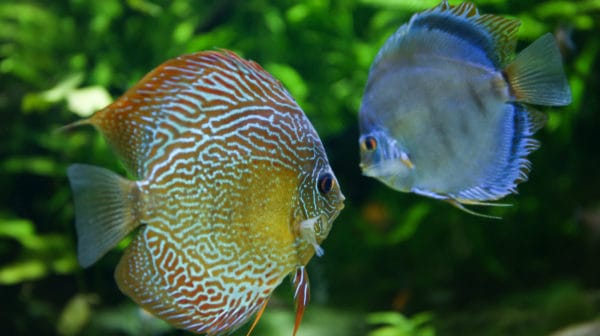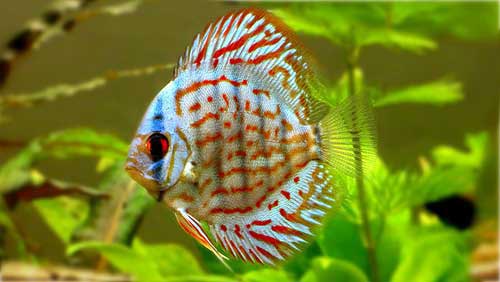Discus fish are generally peaceful but can show aggression during breeding. They are best kept in calm, stable environments.
Discus fish, known for their vibrant colors and unique shape, originate from the Amazon basin. They thrive in warm, soft, and acidic water conditions. Proper tank setup and maintenance are crucial for their well-being. Discus fish require a spacious tank with plenty of hiding spots and minimal stress factors.
Community tanks with compatible species can work, but avoid aggressive tank mates. Feeding them a varied diet ensures their health and longevity. Observing their behavior can help in identifying any signs of stress or illness. Successful discus fish care involves attention to detail and a commitment to maintaining optimal water quality.
Introduction To Discus Fish
Discus fish are captivating and colorful freshwater fish. They are popular in the aquarium hobby. These fish are known for their unique shape and vibrant colors. Many people wonder if discus fish are aggressive. To understand their behavior, let’s first learn about their natural habitat and physical characteristics.
Natural Habitat
Discus fish originate from the Amazon River basin. They thrive in warm, slow-moving waters. These waters are often acidic and soft. The environment is lush with vegetation and submerged roots. This habitat provides many hiding spots for the fish. Discus fish live in groups called shoals. They feel safer and more secure in groups.
Physical Characteristics
Discus fish have a round, disc-like body shape. They can grow up to 8-10 inches in diameter. Their colors range from blue, green, brown, to red. They have striking patterns and vivid hues. Their eyes are usually red or orange. The fins are large and fan-like, adding to their beauty.
Here is a table summarizing their key characteristics:
| Feature | Description |
|---|---|
| Body Shape | Round and disc-like |
| Size | Up to 8-10 inches |
| Colors | Blue, green, brown, red |
| Eyes | Red or orange |
| Fins | Large and fan-like |
Discus fish are truly a sight to behold. Their appearance and behavior make them fascinating to observe.

Credit: www.youtube.com
Behavioral Traits
Discus fish are fascinating creatures with unique behavioral traits. Understanding their behavior can help in maintaining a peaceful aquarium. Let’s dive into their social nature and how they interact with other fish.
Social Nature
Discus fish are known for their social nature. They prefer to live in groups. A group of six or more is ideal. This grouping helps them feel secure. Discus fish often swim together in a synchronized manner. Their social behavior includes forming a pecking order. The strongest fish typically become the leaders. They are generally peaceful but can show dominance.
Interaction With Other Fish
Discus fish can be territorial, especially during breeding times. They may chase away other fish. Choosing the right tank mates is crucial. Peaceful fish like tetras and corydoras are good companions. Avoid aggressive fish like cichlids. Discus fish thrive in calm environments. Stress can make them more aggressive.
- Choose tank mates carefully.
- Keep the environment calm.
- Avoid overcrowding the tank.
Monitoring their interactions can help maintain harmony in the tank. Providing hiding spots can reduce stress. Plants and decorations are useful for this purpose.
Aggression In Discus Fish
Discus fish are known for their vibrant colors and graceful swimming. They are peaceful by nature. But sometimes, they show signs of aggression. Understanding why they act aggressively is important.
Signs Of Aggression
Discus fish display aggression through various signs. They might chase other fish around the tank. Fins may flare, and they can nip at each other. Sometimes, they become territorial and guard a specific area.
Here are some common signs:
- Chasing other fish
- Flaring fins
- Nipping at fins or bodies
- Guarding a particular spot
Common Triggers
Several factors can trigger aggression in discus fish. Overcrowding is a major cause. When too many fish are in a small tank, they compete for space. Poor water quality also stresses the fish.
Here are some common triggers:
| Trigger | Description |
|---|---|
| Overcrowding | Too many fish in one tank |
| Poor Water Quality | Dirty or unbalanced water |
| Breeding | During mating season, they become territorial |
| New Tankmates | New fish can disrupt the social order |
Understanding these triggers can help maintain a peaceful tank. Keep the tank clean and monitor fish behavior. This will ensure a harmonious environment for your discus fish.

Credit: be.chewy.com
Environmental Factors
Discus fish are known for their stunning colors and graceful swimming. But their behavior can be influenced by their environment. Understanding the environmental factors is key to managing their aggression.
Tank Setup
The tank setup plays a crucial role in the behavior of discus fish. A well-planned tank setup can reduce stress and aggression among the fish.
- Tank Size: A spacious tank provides ample swimming room.
- Hiding Places: Include plants, rocks, and decorations.
- Tank Mates: Choose peaceful, non-aggressive species.
Discus fish prefer a calm and spacious environment. Crowded tanks can lead to stress and aggressive behavior.
Water Conditions
Maintaining optimal water conditions is essential for discus fish health. Poor water quality can increase stress and aggression.
| Parameter | Optimal Range |
|---|---|
| Temperature | 82-86°F (28-30°C) |
| pH Level | 6.0-7.0 |
| Water Hardness | 1-4 dGH |
Regular water changes and monitoring keep the environment stable. Stable conditions help in reducing aggression among discus fish.
Tank Mates For Discus Fish
Discus fish are beautiful and peaceful creatures. Choosing the right tank mates ensures a harmonious aquarium. Careful selection avoids stress and aggression in your tank.
Compatible Species
Some species get along well with discus fish. These species share similar water and temperature needs.
- Cardinal Tetras – Small and peaceful, they add color.
- Rummy Nose Tetras – Active swimmers that keep to themselves.
- Corydoras Catfish – Bottom dwellers that clean the tank.
- German Blue Rams – Small cichlids that are non-aggressive.
Species To Avoid
Some fish species should not share a tank with discus fish. These species can cause stress and aggression.
- Angelfish – They can be territorial and aggressive.
- Barbs – Known for nipping at fins.
- Oscars – Large and aggressive, they need different conditions.
- Betta Fish – Territorial and often aggressive.
| Compatible Species | Species to Avoid |
|---|---|
| Cardinal Tetras | Angelfish |
| Rummy Nose Tetras | Barbs |
| Corydoras Catfish | Oscars |
| German Blue Rams | Betta Fish |

Credit: www.discus.com
Managing Aggression
Managing aggression in Discus Fish is crucial for a peaceful tank. Discus Fish might show aggression during feeding or breeding. It’s important to know how to manage this behavior for a harmonious aquarium.
Behavioral Solutions
Understanding the behavior of Discus Fish can help reduce aggression. Here are some effective solutions:
- Introduce Fish Gradually: Add new fish one at a time. This helps reduce shock and territorial disputes.
- Maintain a Balanced Diet: Feed your Discus Fish a varied diet. This keeps them healthy and less stressed.
- Monitor Breeding Pairs: Breeding pairs can be more aggressive. Keep an eye on them to ensure they don’t harm other fish.
Environmental Adjustments
Making changes to the environment can also help manage aggression. Consider these adjustments:
| Adjustment | Benefit |
|---|---|
| Provide Hiding Spots | Reduces stress by offering places to hide. |
| Increase Tank Size | Gives fish more space to establish territories. |
| Maintain Water Quality | Healthy water reduces stress and aggression. |
Discus Fish can be less aggressive with the right environment and care. Implementing these solutions can lead to a more peaceful and healthy aquarium.
Breeding And Aggression
Discus fish are known for their vibrant colors and unique shapes. During breeding, they show different behaviors. These behaviors include increased aggression. Understanding their breeding and aggression can help in maintaining a healthy tank.
Mating Behavior
Discus fish form pairs during mating season. They become territorial during this period. The pair will often choose a specific spot in the tank. This spot becomes their breeding ground.
Male discus fish become more aggressive during mating. They will chase away other fish. This ensures the safety of their chosen spot.
Female discus fish also show signs of aggression. They protect the eggs and the breeding area. Both parents work together to ensure the safety of their future fry.
Protecting The Fry
Once the eggs hatch, discus fish become very protective. They guard their fry from any potential threats.
Both parents take turns watching over the fry. They ensure they are fed and safe. This period is crucial for the survival of the young fish.
Discus fish might attack other fish during this time. This aggressive behavior is to protect their fry. It’s important to monitor the tank during this period.
Here’s a quick summary of their aggressive behavior during breeding:
| Stage | Behavior | Reason |
|---|---|---|
| Mating | Increased territorial aggression | To protect the breeding spot |
| Egg Laying | Female guards the eggs | Ensure safety of the eggs |
| Fry Protection | Both parents become more protective | Ensure survival of the fry |
Understanding these behaviors helps in creating a peaceful tank environment. It also ensures the health and safety of all fish in the tank.
Conclusion
Discus fish can display aggression, especially during breeding. Proper tank setup helps minimize conflicts. Ensure ample space and hiding spots. Monitor their behavior regularly to prevent issues. Understanding their needs creates a peaceful aquarium environment. With the right care, discus fish can thrive harmoniously in your tank.
